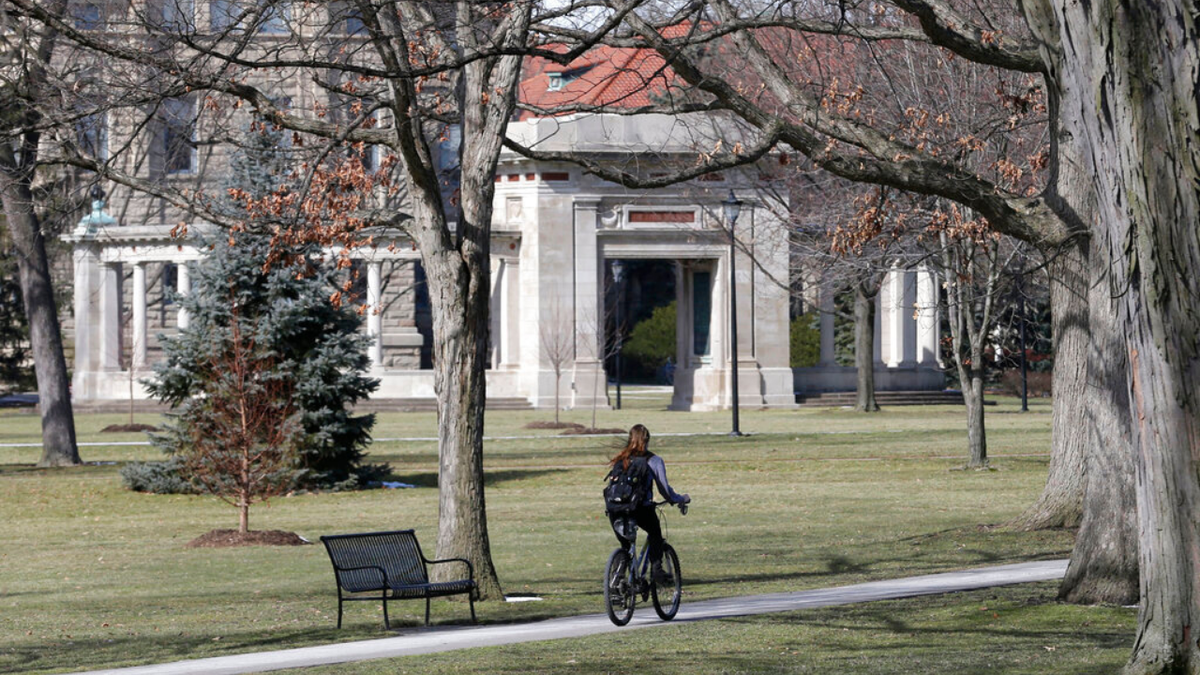Ohio court upheld $32 million win against Oberlin College over false racial accusations
Gutfeld and guests discuss the Ohio court’s decision to grant a $32 million victory to a bakery over Oberlin college students due to false racial accusations on ‘Gutfeld!’
Our civil justice system too often allows the party with deeper pockets to prolong litigation until the other side runs out of money. In other words, even though the facts and the merits may favor David, Goliath may still be able to hold the advantage.
Gibson’s Bakery v. Oberlin College is the quintessential case in point. It is an example of what can happen when politically motivated academic arrogance, fueled by a $937-million endowment, sets out to destroy a politically incorrect small business that took a principled stand in the face of a very real – and now virtually imminent – threat to its continued existence.
Last week, lawyers for Gibson’s Bakery filed a motion requesting that the trial judge hold a hearing and require that Oberlin pay the $31.5 million award, the largest defamation verdict in Ohio history, issued when a jury found in Gibson’s favor in 2019. Otherwise, the 137-year-old family-owned bakery known for its whole wheat donuts, "may not survive the continuing consequences of Oberlin’s malicious and tortious conduct." When the Ohio Court of Appeals confirmed the jury verdict this past spring, it became incumbent on Oberlin to seek a delay in the execution of the judgment pending a possible appeal. It failed to do so.
Gibson’s ongoing nightmare began on Nov. 9, 2016. On that day, an Oberlin College sophomore named Jonathan Aladin, who happened to be Black, entered the bakery, shoplifted two bottles of wine, and then tried to use a fake ID to purchase alcohol. When confronted by David Gibson, the grandson of the co-owner, he fled the store and was tackled outside, at which time two other Black Oberlin students came to Mr. Aladin’s assistance and repeatedly assaulted Gibson. Informed by police that they intended to arrest the Oberlin students, David Gibson, Allyn’s father and a witness to the entire episode, exclaimed. "They’re going to be trashing us!"

A student rides a bicycle on the campus of Oberlin College in Ohio on March 5, 2013. (AP Photo/Tony Dejak)
It didn’t take long. The next morning, 200 to 300 demonstrators, mostly Oberlin students, some with bullhorns, massed across the street separating the Oberlin campus from Gibson’s Bakery. Shouting "No justice, no peace," and using the bullhorns, the students charged that "Three students were assaulted and arrested as a result of a history of racial profiling and racial discrimination by Gibson’s Bakery."
A flier was also handed out at the protest that urged a boycott of the bakery and charged it with being a "RACIST establishment with a LONG ACCOUNT OF RACIAL PROFILING and DISCRIMINATION" (emphasis in original). The flier also noted the "heinous event involving the owners of this establishment," claiming that Allyn Gibson had racially profiled Aladin, improperly chased him out of the store, and assaulted him.
Every one of these statements was false and defamatory.
And if the boycott weren’t enough, the Oberlin student senate passed a Senate Resolution calling upon Oberlin students to cease their support for the bakery and demanding that college faculty and administrators "condemn … the treatment of students of color by the Bakery," stating, again, that "Gibson’s has a history of racial profiling and discriminatory treatment of students and residents alike…."
At the protest, Meredith Raimondo, Oberlin’s dean of students, made stacks of these fliers available for students to distribute and even-handed one to a reporter. She also used the megaphone to announce to the students, based on the testimony of a black employee of Gibson’s, "what to do, where to go. Where to get water, use the restrooms, and where to make copies" of the fliers. She also set aside a room nearby where they could go to rest and keep warm, and she subsequently approved college monetary reimbursements for pizza and gloves to be used by protesting students. She also instructed a subordinate to "contact the college’s supplier of food for its dining halls, Bon Appetit, and tell them to stop or halt supplying the college with food from the bakery."
It’s worth noting that eight months after the theft took place, all three students pleaded guilty and all three read a statement exonerating Gibson of any racial animus and acknowledging his right to pursue and detain them.
The Oberlin student newspaper also printed a letter from Emeritus Professor Roger Copeland in which he observed that, "The facts ... are no longer in question. ... The time has come for the Dean of Students, on behalf of the College, to apologize to the Gibson family." Oberlin’s Vice President for Communications, Ben Jones, was unpersuaded, texting, "F--- ROGER COPELAND!" to Raimondo, to which she replied, "F--- him. I’d say unleash the students if I wasn’t convinced this needs to be put behind us." (emphasis added).
Interestingly, Oberlin’s director of Multicultural Resource Center and interim assistant dean of students, Antoinette Myers, also had a similar sense of her influence over the students, urging that "I hope we rain fire and brimstone on that store." (emphasis added). Both of these texts underscore how thoroughly Oberlin’s Leadership understood the influence they wielded over how Oberlin’s students conducted themselves.
As a result of the continuing boycott, the bakery’s income has plummeted.
Throughout, Oberlin has consistently complained that it has been unlawfully punished for the exercise of their First Amendment rights by Oberlin students. The Court of Appeals, however, dismissed Oberlin’s argument outright in a unanimous opinion, stressing that "the sole focus of this appeal is on the separate conduct of Oberlin and Raimondo that allegedly caused damage to the Gibsons, not on the First Amendment rights of individuals to voice opinions or protest."
CLICK HERE TO GET THE OPINION NEWSLETTER
Based on a motion filed last week, however, Gibson’s remaining days as a bakery may now be numbered. David Gibson’s surviving widow has mortgaged virtually all the family’s assets and she estimates that "the bakery may only survive for the next couple of months."
It is remarkable that a college with Oberlin’s history of social justice – founded in 1833 as a Presbyterian ministry, it was the first college to accept Black students, in 1835, and the first to accept women in 1837 – has strayed so far from its founding principles. Etched on a campus monument to the college’s namesake, John Frederick Oberlin, are the words: "His simple message—that people with diverse perspectives can live in friendship with one another—lies at the heart of the aspirations of this college."
CLICK HERE TO GET THE FOX NEWS APP
This is what college should be about, but at Oberlin politics has now replaced any claim to a search for truth. Sobering are the thoughts of one of Oberlin’s own, past President S. Frederick Starr. His message to Oberlin’s leadership was as eloquent as it was simple. "Pay the judgment," he urged. "Don’t fight it; apologize to the Gibson family and to the community and take steps to show you mean it; and then calmly think through what has happened and do whatever is necessary to reaffirm the institution as a college, not a cause."
Otherwise, after 137 years, Gibson’s Bakery, which has never done anything wrong during this nightmare, may soon perish. And Oberlin College will be unambiguously responsible.












































